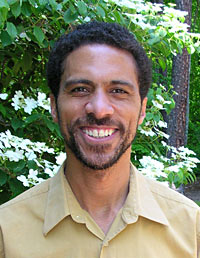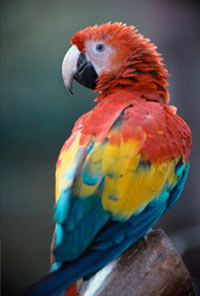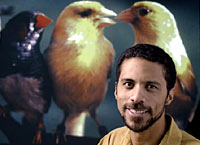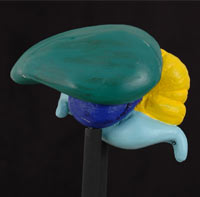


Erich Jarvis studies how birds learn to make new sounds. Jarvis hopes his work will lead to therapies for complex speech problems in humans. 
Parrots can do something only a few other species—whales, dolphins, bats, and human beings among them—can do. They can learn to make new sounds by imitating things they've heard. 
Do you have a question for Erich Jarvis about his work or life outside the lab? Ask him here. 
Until recently, bird brains were considered simple, even primitive. To learn more about how scientists' view of bird brains have changed, explore this rotating model. |
A scientific artistRobert Krulwich: I'd like to begin by setting a scene from your past. It's just before your high school graduation, and, as I understand it, you have options. The Alvin Ailey Dance Company is interested in you as a dancer. Hunter College has offered you a science scholarship. What do you remember about your decision-making process? Erich Jarvis: At the time it felt like an open choice between dance and science. I felt I could have gone either way. Krulwich: So you're lying in bed, looking up at a dark ceiling, and you think, maybe, maybe not, maybe, something like that? Jarvis: I can't remember the exact moment. My memory is actually at the day of graduation, when I really felt like I'd already make that solid decision. Krulwich: For science? Jarvis: For science, that's right. It was a pretty straightforward, solid decision: "This is what I want to do." And that's the way I usually work. I can't recall, but probably the moment I woke up that morning I made the decision. What was likely in the back of my mind was what my mother always had said to me—that it really doesn't matter what you do, just do it to the best of your ability. But also that she would like to see that what I do in my life is something that has a positive impact upon society. Dance can do that, but I thought science perhaps could do it even more. Krulwich: I've heard from your professors that you were an unusually enthusiastic college student. You spent a lot of time in the lab, slept over sometimes... Jarvis: From the outside, it would look like I was quite enthusiastic. From the inside, in me, I was doing what I felt I was supposed to be doing. Krulwich: Do you think of yourself as a nut, or just as a person who falls in love with ideas in a very deep sort of way? Jarvis: Back then, when I was an undergraduate student, no, I didn't think of myself as a nut. Now that I'm a professor and I'm more matured and I know what goes on in life, yes, I think of myself as a nut for being that driven. So I've accepted that conclusion. Krulwich: You come from a family and a culture where life is a serious thing. Jarvis: Yes, life is serious in my family. We were expected to accomplish big things in life. That's what you grow up being taught in my clan. And so for me it goes way back to the dance training I had and also to my mother. Both of those elements in my life told me I had to try hard. Krulwich: Have your successes in science given you the same feeling as you got on stage as a dancer? Jarvis: Yes. As a younger scientist, I remember really thinking about the performing artist in me and the scientific artist in me and somehow merging those two. Krulwich: Why do you call yourself a scientific artist? Jarvis: Because I don't see performing artists and scientists as being really that different. They might look different, but so do a pianist and a dancer. I would say that it's the process that's very similar. The process of becoming a dancer and the process of becoming a scientist are very similar. Krulwich: How? Jarvis: Both require a lot of discipline, a lot of practice, an intense amount of training, and a lot of failure. In both cases, you must keep getting up and trying again. Both are creative. In both art and science you are often trying to do things that have never been done before. As an artist, you're trying to discover new things about yourself, life around you, and the art itself. In science, the goals are the same. Krulwich: Is science hard for you? Jarvis: Sure. A lot of it is trial and error, and a lot of it is trying something and finding it doesn't work. Krulwich: You mean trying out an idea, testing it? Jarvis: Testing an idea, doing experiments, working with collaborators, raising grant money, doing all of this, yes, it can be hard. When I was new to it especially, I was surprised at how much effort I had to put into it, how much stamina and discipline it demanded. And my performing arts training was very helpful to me in terms of dealing with the formidable challenge of being a scientist. Battle of the brainsKrulwich: How did you get interested in birds and their brains? Jarvis: When I was a graduate student, I decided I wanted to study how the brain—the brain in general—works. I was looking at different laboratories that were studying animals and humans. I wasn't satisfied with the kind of behavioral studies that these labs were doing with rats or mice, nor with their studies on primates. As a new student, every neurobiologist is egotistical and wants to study a creature as close to humans as possible. And birds are far away. Yet they have a rich behavioral literature explaining how they perform imitative vocal learning behavior. And so I felt there was an opportunity to apply my previous molecular biology training at Hunter College to the study of the bird brain and how it can produce a complex behavior like vocal learning. That's how I got into it. Krulwich: Bird brains have an international reputation for being stupid, right? Jarvis: It's definitely true that in the public and in the scientific culture, even now, bird brains are not thought to be that intelligent or as behaviorally capable as mammals, and particularly humans. But yet when you look at what they can do, they don't live up to—or down to—that expectation. They can do some pretty smart things. When I got to Rockefeller University for graduate school there were two professors there whose work had shown that bird behavior and brain pathways were quite complex. So as an early graduate student getting to know these studies by professors around me, my prior beliefs were knocked down. And I identified with that process. That's because I already tended to think that lots of animals have intelligent behavior. I think we humans put ourselves up too high. And I realized as a graduate student that I was guilty of that myself. That tension, that process of shifting paradigms was fascinating to me. And I'm still very much involved in that now with my research. Krulwich: Explain what it is that you're working on. Jarvis: My work involves demonstrating that when an animal—a bird, say—produces a particular behavior, the areas of the brain that are responsible for producing that behavior fire specific electrical signals, and those electrical signals cause certain genes to be synthesized. I've found ways to be able to measure the synthesis of those genes in certain brain areas with the animal's behavior. Linking genes and behavior is the key to unlocking brain evolution. My major focus is to understand how we can generate insight from bird brains into the mechanisms of human language. Krulwich: And why was it necessary for your work, and for many, many other scientists' work, to redefine the terminology neurobiologists use to talk about bird brains? Jarvis: Because even though I and many other scientists were studying complex bird behaviors we were using an outdated terminology of the brain that implies the opposite—that bird brains are primitive. We had students who didn't want to study the bird brain because it's labeled with primitive terms that suggest it's just not all that interesting. We had a general public that wasn't understanding why a bird brain is worth studying. And that's not good, because we're not just studying bird brains so we can understand how the bird brain works. We want what we learn about bird brains so that we can understand how our own brain works for public health, for Alzheimer's disease, for Parkinson's. This is more than just bird stuff, and it's important to get it right. So that's why I became part of the effort to rename bird brain structures and helped to organize a change in how we look at bird brains. Krulwich: So who could object to this? All you have to do is change some old names into new names. How hard is that? Jarvis: It wasn't easy. When you get biologists in a room who are really passionate about their beliefs and their work and who have different views you have trouble. Krulwich: Well, I guess it's as if I said, "I have an idea, let's change the names of every town in the Czech Republic," and then I invite all the Czechs to come, discuss, and agree on the new names. That's asking for trouble. Why did you want to be the mediator of all this? Jarvis: I felt that it was necessary, and it was my naïveté at work as well. I was a young professor and I felt it was a moral thing for me to do. Getting alongKrulwich: You didn't take on the avian nomenclature project as a personal ego issue. That's not your style. You're not the kind of guy who insists that your name is on every paper, that your lab is the one and only. So far in your career you've tilted towards a collaborative approach to science. Is that right? Jarvis: Yes. My career has been based on a collaborative way of doing things because it comes naturally for me. This goes back to my upbringing. I tell people you either have a Martin Luther King Jr. family or a Malcolm X family. It's one or the other. My family was a Martin Luther King Jr. family and everybody got along. We worked together. So for me it's quite natural. But it doesn't mean that it's natural in the field of science. That being said, in science breakthroughs often happen when different fields are combined. The discovery of DNA happened because physicists brought their technology and their ideas to biology. They brought an old question to a new field. I think the same thing happens culturally. You have people from different cultural backgrounds coming together, and they bring their cultural thinking in ways that haven't been combined before. Krulwich: Speaking of different cultural backgrounds, when I look around your lab I see all kinds of scientists from all kinds of backgrounds. Not all labs look this way. Why does yours? Jarvis: I haven't tried purposefully to create a multicultural lab. My lab happens to have attracted a diverse group of people from different ethnic backgrounds, from different countries, and it's balanced between men and women. If there's a reason for this it's probably because I'm open to whoever wants to come to the lab. All you have to do is be a person who's smart and ambitious and someone who's ready to challenge the status quo, if necessary. I don't care if you come from Japan, India, or the U.S., or if you're black, white, Native American, or Latino. Krulwich: I have a time question for you. You were a kid, then you were a young scientist, then you were a "hot stuff" young scientist, and now you've hit the big 40. Some people just have an early run of success. A lot of scientists do. What do you think of this? Jarvis: Some studies have actually been done about this, suggesting that scientists have their most significant impact between the ages of 20 and 35, like Einstein. I didn't come to think about it that way until my late 20s, and by the time I hit 30, I really felt like I didn't have much time left. Krulwich: You're going to be a desperate man when you hit 50. Jarvis: I don't want to feel like I've reached my peak, but I might have reached my peak. It's not as if I expect that my thinking power is deteriorating, but the studies I mentioned have shown that after the age of 35, many scientists let their other responsibilities in life take precedence. Family becomes more of a responsibility, or they get laboratories with lots of scientists under their tutelage and they can focus less on their own work. Their energy can decrease if they overextended themselves. I'm getting asked to do things every day. I have to learn how to say no—and I have learned this. I have to and want to keep focused on my work and keep having fun. Krulwich: How do you keep focused and keep having fun?
Jarvis: Science is part fun, part not fun. It's a lot more fun than people
realize. But I do need something else in my life as well, because science is
really hard work, and if you do only one thing you can overextend yourself. So
my other work—or my other fun—is dancing. I find that dancing for
me is now not only a way of having fun and exercising my body. Dancing helps me
explore my creativity. That then goes back into my science.
|
“My major focus is to understand how we can generate insight from bird brains into the mechanisms of human language.” “I have to and want to keep focused on my work and keep having fun.” |
|||||||||
|
Interview conducted by Robert Krulwich, executive editor and host of NOVA scienceNOW, in early 2005 at Erich Jarvis' Duke University lab, and edited by Lexi Krock, associate editor of NOVA online |
|||||||||||
|
© | Created October 2005 |
|||||||||||